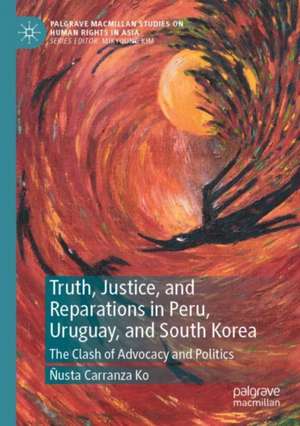Truth, Justice, and Reparations in Peru, Uruguay, and South Korea: The Clash of Advocacy and Politics: Palgrave Macmillan Studies on Human Rights in Asia
Autor Ñusta Carranza Koen Limba Engleză Paperback – 30 ian 2022
| Toate formatele și edițiile | Preț | Express |
|---|---|---|
| Paperback (1) | 781.31 lei 43-57 zile | |
| Springer Nature Singapore – 30 ian 2022 | 781.31 lei 43-57 zile | |
| Hardback (1) | 785.11 lei 43-57 zile | |
| Springer Nature Singapore – 30 ian 2021 | 785.11 lei 43-57 zile |
Preț: 781.31 lei
Preț vechi: 952.81 lei
-18% Nou
Puncte Express: 1172
Preț estimativ în valută:
149.51€ • 156.49$ • 124.43£
149.51€ • 156.49$ • 124.43£
Carte tipărită la comandă
Livrare economică 31 martie-14 aprilie
Preluare comenzi: 021 569.72.76
Specificații
ISBN-13: 9789813349414
ISBN-10: 9813349417
Ilustrații: XI, 306 p. 4 illus.
Dimensiuni: 148 x 210 mm
Greutate: 0.42 kg
Ediția:1st ed. 2021
Editura: Springer Nature Singapore
Colecția Palgrave Macmillan
Seria Palgrave Macmillan Studies on Human Rights in Asia
Locul publicării:Singapore, Singapore
ISBN-10: 9813349417
Ilustrații: XI, 306 p. 4 illus.
Dimensiuni: 148 x 210 mm
Greutate: 0.42 kg
Ediția:1st ed. 2021
Editura: Springer Nature Singapore
Colecția Palgrave Macmillan
Seria Palgrave Macmillan Studies on Human Rights in Asia
Locul publicării:Singapore, Singapore
Cuprins
1. Chapter 1.- When the Pressure of the World Has Dissipated Introduction, 2. Chapter 2.- Converging Theories of Human Rights and Transitional Justice, 3. Chapter 3.- Political Dynamics of Transitional Justice Change in Peru, 4. Chapter 4.- Uruguay’s Path Towards Justice, 5.Chapter 5.- The Story of South Korea’s Past Abuses and Present Policies,6. Chapter 6.- Conclusion Domestic Politics, International Pressure, and Transitional Justice.
Notă biografică
Ñusta Carranza Ko is an Assistant Professor in the School of Public and International Affairs at the University of Baltimore. She is the co-author of Theories of International Relations and the Game of Thrones (Lanham: Lexington Books, 2019). Her research focuses on transitional justice in Latin America and Asia, and indigenous peoples’ rights in Peru.
Textul de pe ultima copertă
“Ñusta Carranza Ko's exciting new book deftly challenges the conventional wisdom, showing through detailed case studies of Peru, Uruguay, and South Korea that domestic political factors dominate over international advocacy in explaining long term adherence to--or backsliding from--international human rights and transitional justice norms. Carranza Ko should be commended for an important contribution to international relations and political science.”
--Clifford Bob, Professor and Chair of Political Science, Duquesne University
--Clifford Bob, Professor and Chair of Political Science, Duquesne University
This book presents the first cross-regional analysis of post-transitional justice periods and the conditions that influence states’ behaviors. Specifically, the book examines why states that adopt and ostensibly implement transitional justice norms as policies—criminal prosecutions, reparations policies, and truth commissions—fail to follow through with their recommendations. Applying these perspectives to a comparative study of states from Latin America and East Asia—namely, Peru, Uruguay, and South Korea—which accepted and implemented transitional justice norms but took different trajectories of behavior after the implementation of policies, this book contributes to understanding the relationship of norm influence on states and why states change in compliance after norm adoption. The book explores the conditions that contribute or limit the continued respect for transitional justice norms, emphasizing the political interests and transnational advocacy networks’ roles in affecting states’ policies of addressing past abuses.
Ñusta Carranza Ko is an Assistant Professor in the School of Public and International Affairs at the University of Baltimore. She is the co-author of Theories of International Relations and the Game of Thrones (Lanham: Lexington Books, 2019). Her research focuses on transitional justice in Latin America and Asia, and indigenous peoples’ rights in Peru.
Caracteristici
Questions transitional justice literature’s expectation on positive changes resulting from truth-seeking, reparations, and criminal accountability Argues that international human rights norms are not enough to fundamentally change states’ policies or sustain states’ course of compliance Elaborates on how transitional justice policies are affected by two factors: the interest of states and the activism of international and domestic human rights actors Demonstrates the vulnerability of states’ commitment to normative obligations and the continued importance domestic political utility calculations have in determining state behaviour






